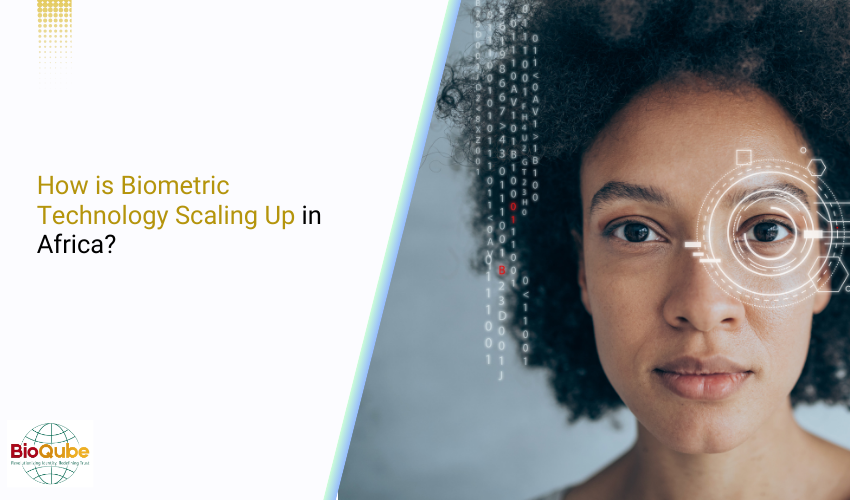
Biometric technology is scaling up rapidly in Africa for numerous reasons beyond enhanced security and convenience. It addresses the widespread challenges of creating government identity proofs in regions that government agents find challenging to reach, particularly in rural areas.
Today, biometrics are reshaping the public’s journey with digital identity registration, revoking identity theft and fraud, and providing benefits to the correct individual. Moreover, the technology is proving instrumental in healthcare, BFSI, and other sectors, providing critical advantages to the African population and the organization’s stakeholders.
According to a Statista report, the global biometrics market’s annual growth rate in the Middle East and Africa will be 24.16% in 2024. Although this is far less than in North America, Europe, Asia Pacific, and Latin America, the impact is still significant.
How Biometrics Are Unlocking Opportunities in the African Continent
Biometrics in the Financial Institutions
According to the Biometric Institute, more than 454 million people in Sub-Saharan Africa lack formal identity documentation. The report further elaborates that nearly 149 million people (78% of the Nigerians) can’t prove their identities, resulting in problems during their banking and service journeys.
So, there are national initiatives in place to help the population with this problem of availing financial services. As mobile and biometric technology adoption increases in 2024 across the continent, we can expect a 23% projected growth in the mobile banking domain and a substantial increase in secure identification solutions.
The ongoing and upcoming projects would significantly enable the stakeholders to combat online fraud and provide security to the customers during their transactions.
Public Administration and National ID Programs
The African government is witnessing a surge in government IDs with its new initiative of biometric digital IDs while enhancing public administration. According to a source, Kenya’s Huduma Namba and Nigeria’s National Identity Management Commission are leading examples of implementations using biometric data while decreasing the instances of identity theft and assuring secure citizen identification.
The report further highlights that the need for biometric identity systems is projected to grow by 17% with the adoption of new national identification projects by more governments.
Modular Open-Source Identity Platform (MOSIP) is an open-source ID solution implemented across African countries that provides cost-effective solutions for driving scalability. Bioqube Inc. is also leading the change in a similar way across the African continent with its state-of-the-art US-patented technology. The company’s innovations significantly simplify biometric ID streamlining across healthcare, education, and social protection domains, minimizing fraud and ensuring that the services reach eligible citizens.
Strengthen Healthcare and Social Protection
Biometric systems in Africa are proving to be essential in the healthcare and social protection domain. As stated before, they ensure that the services are rendered by the registered users. They also eliminate the risk of identity theft and fraud, as biometrics remain unique to an individual.
Moreover, biometric systems eliminate the risk of providing incorrect treatment to the patient, which acts as a major safety net and prevents organizations from becoming victims of lawsuits while safeguarding the patients’ health.
Biometrics in social grants systems also eliminates the risk of duplicate claims, safeguards the organization’s interests, and prevents patients from becoming unnecessary victims of fraudulent claim suits. For these and other reasons, biometrics in the healthcare domain are projected to grow by 20%.
Telecommunications and SIM Registration
Rwanda conducted a pilot for biometric SIM registration and verification in September 2024. It was a step towards the fraud prevention regulations issued by the Rwanda Utilities Regulatory Authority (RURA).
Under the new regulations, the SIM card registration process requires owner verification or identification using their registered biometrics in the National Identification Agency (NIDA) database. However, telecommunication service providers would still need to undergo the Know Your Customer (KYC) process even during the activation method linking it to a unique identification number.
Since mobile biometrics penetration will increase rapidly, sources state that the telecom market will achieve an annual growth rate of 19%.
Border Security and Law Enforcement
The implementation of biometric systems across airports and checkpoints is enhancing security. It is streamlining immigration checks, diminishing human trafficking, and preventing unauthorized entries.
The incorporation of such technology also makes it convenient for the airport security staff to verify documents, provide a more convenient method of boarding, and flag people based on risk scores.
Bioqube’s IDenTrip is one such solution that can benefit airports. It can provide all these benefits along with background AML, PEP, and sanction checks. Additionally, it can curate information to enhance the traveler’s experience.
Additionally, Bioqube’s Video Analytics is yet another solution that can revamp airport security. It can detect human faces, objects, and gestures at the airport using the IP cameras installed within it. The next-gen solution can alert airport officials about any suspicious activity and provide more time to secure the premises or take action.
Conclusion
Biometric technology will upscale healthcare, law enforcement, border security, telecommunication, public administration, and BFSI across the African continent. The rising scope is evident with the Biometric SIM registration, KYC, healthcare benefits, etc.
The biggest advantage that biometric technology has given Africa is reaching out to the masses and providing a mobile-friendly secure method, allowing easy registration and preventing the risk of identity theft.
Today, the governments of Africa and other countries have realized the potential of biometric technology across sectors and critical advantages such as high-end security, end-user convenience, mass reach, etc. They are implementing biometric solutions, primarily driven by face recognition. Schedule a demo with us to learn how it can benefit your organization.